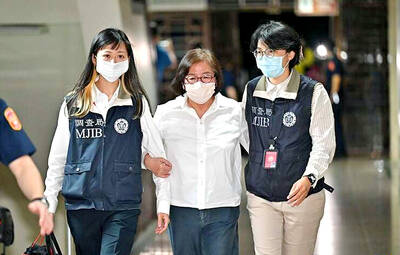Taiwan’s agreement to relax restrictions on imports of US beef is much laxer than that agreed between South Korea and the US, the Democratic Progressive Party (DPP) said yesterday, reiterating its demand the government re-launch negotiations with the US over the decision.
Speaking at a press conference, DPP Spokesman Tsai Chi-chang (蔡其昌) showed an enlarged copy of the protocol signed between Taiwan and US on Oct. 22 and the US-South Korea agreement forged last year when Seoul lifted its ban on US beef, saying the requirements listed in the Taiwan version were much more lenient.
The government has said that the agreement opening Taiwan’s market to US beef and related products was comparable to Seoul’s.
The eight-page protocol said Taiwan would allow imports of US bone-in beef, bovine internal organs and meat from cattle older than 30 months of age — all forbidden products under the previous ban because of concerns over bovine spongiform encephalopathy (BSE), or mad cow disease. These products are still banned in South Korea, Tsai said.
“Not only did President Ma Ying-jeou (馬英九) lack competence when negotiating with the US, he also jeopardized Taiwan’s public health by lying to the people. The DPP reiterates its demand for the government to start the negotiations afresh in the face of a flawed protocol,” Tsai said.
DPP Legislator Kuan Bi-ling (管碧玲) criticized National Security Council (NSC) chief Su Chi (蘇起), who on Thursday said that being an international agreement, it was perfectly normal that the Taiwan-US protocol to be published in English only.
“According to the law, all treaties or agreements must be stated in Chinese and the official language used by the other party. It is hard to fathom why our NSC chief has such a poor understanding of international courtesy,” Kuan said.
The protocol can be found on the Department of Health Web site.

Costa Rica sent a group of intelligence officials to Taiwan for a short-term training program, the first time the Central American country has done so since the countries ended official diplomatic relations in 2007, a Costa Rican media outlet reported last week. Five officials from the Costa Rican Directorate of Intelligence and Security last month spent 23 days in Taipei undergoing a series of training sessions focused on national security, La Nacion reported on Friday, quoting unnamed sources. The Costa Rican government has not confirmed the report. The Chinese embassy in Costa Rica protested the news, saying in a statement issued the same

Taiwan is to extend its visa-waiver program for Philippine passport holders for another year, starting on Aug. 1, Minister of Foreign Affairs Lin Chia-lung (林佳龍) said on Friday. Lin made the announcement during a reception in Taipei marking the 127th anniversary of Philippine independence and the 50th anniversary of the establishment of the Manila Economic and Cultural Office (MECO) in Taiwan, the Ministry of Foreign Affairs said. The decision reflected Taiwan’s commitment to deepening exchanges with the Philippines, the statement cited Lin as saying, adding that it was a key partner under the New Southbound Policy launched in 2016. Lin also expressed hope

Temperatures in New Taipei City’s Sindian District (新店) climbed past 37°C yesterday, as the Central Weather Administration (CWA) issued heat alerts for 16 municipalities, warning the public of intense heat expected across Taiwan. The hottest location in Taiwan was in Sindian, where the mercury reached 37.5°C at about 2pm, according to CWA data. Taipei’s Shilin District (士林) recorded a temperature of 37.4°C at noon, Taitung County’s Jinfeng Township (金峰) at 12:50 pm logged a temperature of 37.4°C and Miaoli County’s Toufen Township (頭份) reached 36.7°C at 11:40am, the CWA said. The weather agency yesterday issued a yellow level information notice for Taipei, New

CASE: Prosecutors have requested heavy sentences, citing a lack of remorse and the defendants’ role in ‘undermining the country’s democratic foundations’ Five people affiliated with the Chinese Nationalist Party (KMT), including senior staff from the party’s Taipei branch, were indicted yesterday for allegedly forging thousands of signatures to recall two Democratic Progressive Party (DPP) lawmakers. Those indicted include KMT Taipei chapter director Huang Lu Chin-ru (黃呂錦茹), secretary-general Chu Wen-ching (初文卿) and secretary Yao Fu-wen (姚富文), the Taipei District Prosecutors’ Office said in a news release. Prosecutors said the three were responsible for fabricating 5,211 signature forms — 2,537 related to the recall of DPP Legislator Wu Pei-yi (吳沛憶) and 2,674 for DPP Legislator Rosalia Wu (吳思瑤) — with forged entries accounting for